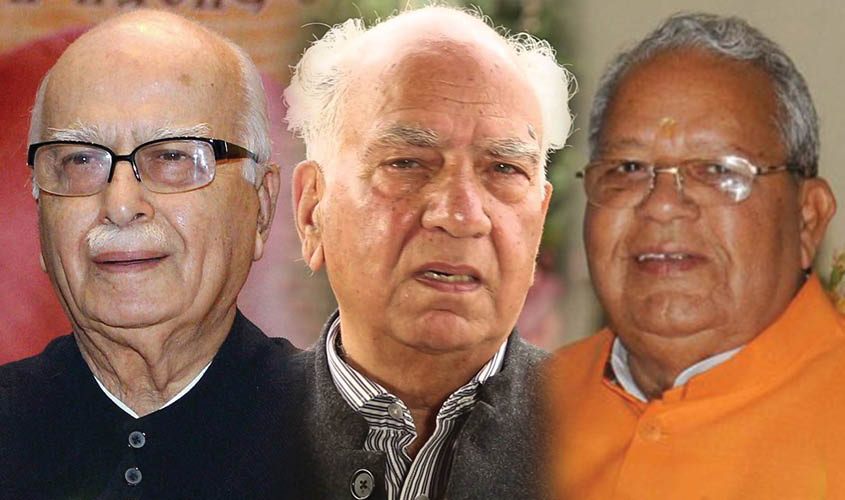New Delhi: Uncertain of how seniors who were sought to be dropped from the Bharatiya Janata Party’s list of candidates for the 2019 Parliamentary elections would react, the Rashtriya Swayamsevak Sangh, through emissaries, attempted to convince them to opt out of the race voluntarily. A few days ago, BJP’s chief architect, L.K. Advani, was approached by the party’s organising secretary, Ram Lal, and candidly asked whether he was interested in contesting the Lok Sabha elections or not.
Sources said that sensing that this question had been posed to him with the intention of seeking his wilful withdrawal from the electoral battle, Advani forthrightly informed Ram Lal, who principally coordinates the activities of the BJP and the RSS, that he had decided not to enter the fray. However, he proposed that in his place, his daughter, Pratibha, whom he had groomed in politics, should be considered for the Gandhinagar constituency, which he represented eight times, besides serving four terms in the Rajya Sabha.
Promising to revert back, Ram Lal discussed the matter with the BJP’s central leadership; Prime Minister Narendra Modi and Amit Shah apparently believed that instead of Pratibha, Advani’s son, Jayant would be a more suitable nominee. Advani got the drift of the core of the discussion, subsequently summoning Ram Lal to his Prithviraj Road residence.
Visibly upset and hurt by the developments, he categorically communicated to the BJP-RSS leader that if the party was adamant not to accept and regard his recommendation for his seat, there was no need to grant the nomination to any member of his family. The implication was that the BJP patriarch did not mince any words in stating that his sole preference was his daughter, Pratibha. Needless to say that Jayant could not conceal his disappointment over his father’s rebuttal to the party. The issue then came up for discussion in the Parliamentary Board, and it was unanimously decided to field Amit Shah from Gandhinagar, thereby bringing to an end Advani’s eventful political innings. However, by declaring Shah’s candidacy in the official press release immediately after Modi’s nomination from Varanasi, a strong and unambiguous message was conveyed to the rank and file regarding the party’s current pecking order. Political circles were quick to interpret that the fact of Shah being number two in this dispensation was given a formal seal, and if Modi were to return as Prime Minister, the BJP president would undoubtedly be second in command.
Similar pressure was exerted on Kalraj Mishra not to push forward his claim for the Deoria constituency in Uttar Pradesh. The 77-year-old veteran, who served for nearly three years as a minister in the Modi government, declared with great reluctance that he would not be contesting the elections. With him out of the picture, the BJP is considering several names, including that of General Tripathi, who comes from a well-known family of Deoria.
Former Himachal Pradesh Chief Minister and strongman, Shanta Kumar apparently caved in to the pressure and as a consequence shall not be seeking another term from Kangra. He has been replaced by Kishan Kapoor, an MLA who is popular in the Dharamshala region. However, Shanta Kumar’s absence from the electoral battle could hurt and impair the BJP in the state, which accounts for four Lok Sabha seats. It is a known fact that he has a considerably sizeable following amongst Brahmins.
The fourth illustrious member of the Margdarshak Mandal who has been sounded to make a quiet exit is Murli Manohar Joshi, former BJP president and the sitting MP from Kanpur. Joshi, who is easily the senior most Lok Sabha member from the BJP, having been first elected in 1977 from Almora, is, needless to say, eager to contest. He is also the best-known and most recognisable Brahmin face of the saffron brigade after Atal Bihari Vajpayee. Sources said that when his views were sought by Ram Lal, he conveyed to him that he was more than adequately prepared to contest from his present constituency and it was up to the party to provide him the ticket. Unlike Advani, Mishra and Shanta Kumar, Joshi was clearly in no mood to give up his claim.
The party and the RSS would take the final call since Joshi is considered extremely close to the Sangh, which wanted him to be the BJP nominee for the Presidential elections in 2017 in place of Ram Nath Kovind, who was Modi and Shah’s choice. There is a section within the RSS that believes that justice was not served to Joshi in spite of his deep commitment to the Sangh’s ideology and tireless service to the organisation. Like Advani, he played a pivotal role in moulding Modi when the latter was a junior leader in the BJP.
With the BJP deciding to support Union Minister Ravi Shankar Prasad from Patna Saheb, the Sangh’s association with Shatrughan Sinha, which commenced in 1977, may have also come to an end. Sinha, the original Bihari Babu, and an iconic and distinctive figure from the state, had for some time been disgruntled, leaving no occasion to take pot-shots at Modi and Shah. He was amongst the first persons from the film fraternity, who in 1977 had opposed the Emergency and the authoritarian Congress regime. Others in that movement included super star, the late Dev Anand, Dadasaheb Phalke award winner, Pran and I.S. Johar. Sinha could possibly now be the opposition nominee from Patna Saheb.

